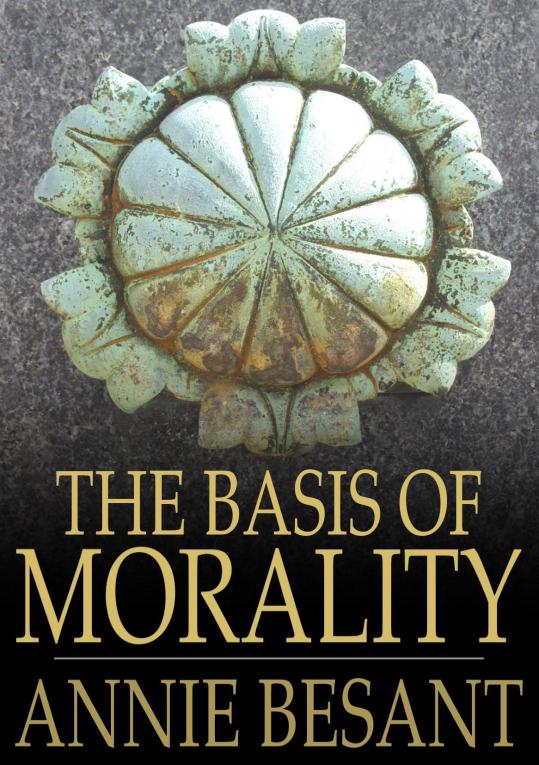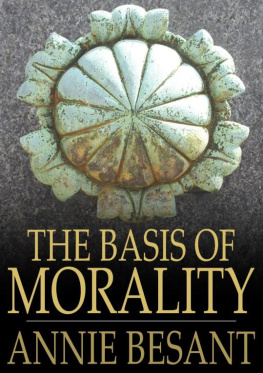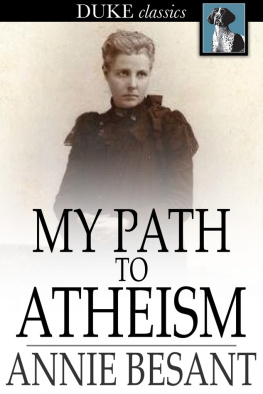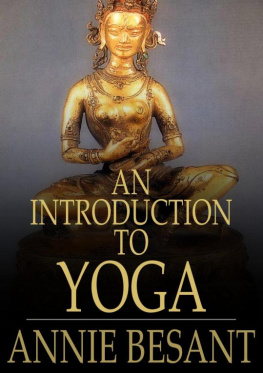Besant - The Basis of Morality
Here you can read online Besant - The Basis of Morality full text of the book (entire story) in english for free. Download pdf and epub, get meaning, cover and reviews about this ebook. City: Waiheke Island, year: 2009, publisher: The Floating Press, genre: Science. Description of the work, (preface) as well as reviews are available. Best literature library LitArk.com created for fans of good reading and offers a wide selection of genres:
Romance novel
Science fiction
Adventure
Detective
Science
History
Home and family
Prose
Art
Politics
Computer
Non-fiction
Religion
Business
Children
Humor
Choose a favorite category and find really read worthwhile books. Enjoy immersion in the world of imagination, feel the emotions of the characters or learn something new for yourself, make an fascinating discovery.
The Basis of Morality: summary, description and annotation
We offer to read an annotation, description, summary or preface (depends on what the author of the book "The Basis of Morality" wrote himself). If you haven't found the necessary information about the book — write in the comments, we will try to find it.
Besant: author's other books
Who wrote The Basis of Morality? Find out the surname, the name of the author of the book and a list of all author's works by series.
The Basis of Morality — read online for free the complete book (whole text) full work
Below is the text of the book, divided by pages. System saving the place of the last page read, allows you to conveniently read the book "The Basis of Morality" online for free, without having to search again every time where you left off. Put a bookmark, and you can go to the page where you finished reading at any time.
Font size:
Interval:
Bookmark:


The Basis of Morality
From a 1915 edition.
ISBN 978-1-775410-98-0
2009 THE FLOATING PRESS.
While every effort has been used to ensure the accuracy and reliability of the information contained in The Floating Press edition of this book, The Floating Press does not assume liability or responsibility for any errors or omissions in this book. The Floating Press does not accept responsibility for loss suffered as a result of reliance upon the accuracy or currency of information contained in this book. Do not use while operating a motor vehicle or heavy equipment. Many suitcases look alike.
Visit www.thefloatingpress.com
Must religion and morals go together? Can one be taught without theother? It is a practical question for educationists, and France triedto answer it in the dreariest little cut and dry kind of catechism evergiven to boys to make them long to be wicked. But apart from education,the question of the bedrock on which morals rest, the foundation onwhich a moral edifice can be built that will stand secure against thestorms of lifethat is a question of perennial interest, and it mustbe answered by each of us, if we would have a test of Right and Wrong,would know why Right is Right, why Wrong is Wrong.
Religions based on Revelation find in Revelation their basis formorality, and for them that is Right which the Giver of the Revelationcommands, and that is Wrong which He forbids. Right is Right becauseGod, or a Rshi or a Prophet, commands it, and Right rests on theWill of a Lawgiver, authoritatively revealed in a Scripture.
Now all Revelation has two great disadvantages as a basis for morality.It is fixed, and therefore unprogressive; while man evolves, and at alater stage of his growth, the morality taught in the Revelation becomesarchaic and unsuitable. A written book cannot change, and many things inthe Bibles of Religion come to be out of date, inappropriate to newcircumstances, and even shocking to an age in which conscience hasbecome more enlightened than it was of old.
The fact that in the same Revelation as that in which palpably immoralcommands appear, there occur also jewels of fairest radiance, gems ofpoetry, pearls of truth, helps us not at all. If moral teachings worthyonly of savages occur in Scriptures containing also rare and preciousprecepts of purest sweetness, the juxtaposition of light and darknessonly produces moral chaos. We cannot here appeal to reason or judgmentfor both must be silent before authority; both rest on the same ground."Thus saith the Lord" precludes all argument.
Let us take two widely accepted Scriptures, both regarded asauthoritative by the respective religions which accept them as comingfrom a Divine Preceptor or through a human but illuminated being, Mosesin the one case, Manu in the other. I am, of course, well aware thatin both cases we have to do with books which may contain traditions oftheir great authors, even sentences transmitted down the centuries.The unravelling of the tangled threads woven into such books is a workneeding the highest scholarship and an infinite patience; few of usare equipped for such labour. But let us ignore the work of the HigherCriticism, and take the books as they stand, and the objection raisedto them as a basis for morality will at once appear.
Thus we read in the same book: "Thou shalt not avenge, nor bear anygrudge against the children of thy people, but thou shalt love thyneighbour as thyself." "The stranger that dwelleth with you shall beunto you as one born among you, and thou shalt love him as thyself, forye were strangers in the land of Egypt." "Sanctify yourselves thereforeand be ye holy." Scores of noble passages, inculcating high morality,might be quoted. But we have also: "If thy brother, the son of thymother, or thy son, or thy daughter, or the wife of thy bosom, or thyfriend which is as thine own soul, entice thee secretly saying, let usgo and serve other Gods ... thou shalt not consent unto him nor hearkenunto him; neither shalt thine eye pity him, neither shalt thou spare,neither shalt thou conceal him, but thou shalt surely kill him; thinehand shall be first upon him to put him to death." "Thou shalt notsuffer a witch to live." A man is told, that he may seize a fair womanin war, and "be her husband and she shall be thy wife. And it shall bethat if thou hast no delight in her, then thou shalt let her go whithershe will." These teachings and many others like them have drenchedEurope with blood and scorched it with fire. Men have grown out ofthem; they no longer heed nor obey them, for man's reason performs itseclectic work on Revelation, chooses the good, rejects the evil. Thisis very good, but it destroys Revelation as a basis. Christians haveoutgrown the lower part of their Revelation, and do not realise thatin striving to explain it away they put the axe to the root of itsauthority.
So also is it with the Institutes of Manu, to take but one examplefrom the great sacred literature of India. There are precepts ofthe noblest order, and the essence and relative nature of morality isphilosophically set out; "the sacred law is thus grounded on the ruleof conduct," and He declares that good conduct is the root of furthergrowth in spirituality. Apart from questions of general morality, towhich we shall need to refer hereafter, let us take the varying viewsof women as laid down in the present Smrti as accepted. On manypoints there is no wiser guide than parts of this Smrti, as willbe seen in Chapter IV. With regard to the marriage law, Manu says:"Let mutual fidelity continue unto death." Of a father He declares:"No father who knows must take even the smallest gratuity for hisdaughter; for a man, who through avarice takes a gratuity, is a sellerof his offspring." Of the home, He says: "Women must be honoured andadorned by their fathers, husbands, brothers and brothers-in-law whodesire happiness. Where women are honoured, there the Devas arepleased; but where they are not honoured, any sacred rite is fruitless.""In that family where the husband is pleased with his wife and thewife with her husband (note the equality), happiness will assuredly belasting." Food is to be given first in a house to "newly-married women,to infants, to the sick, and to pregnant women". Yet the same Manu issupposed to have taken the lowest and coarsest view of women: "It isthe nature of women to seduce men; for that reason the wise are neverunguarded with females ... One should not sit in a lonely place withone's mother, sister or daughter; for the senses are powerful, andmaster even a learned man." A woman must never act "independently, evenin her own house," she must be subject to father, husband or (on herhusband's death) sons. Women have allotted to them as qualities, "impuredesires, wrath, dishonesty, malice and bad conduct". The Shudraservant is to be "regarded as a younger son"; a slave is to be lookedon "as one's shadow," and if a man is offended by him he "must bear itwithout resentment"; yet the most ghastly punishments are ordered to beinflicted on Shudras for intruding on certain sacred rites.
The net result is that ancient Revelations, being given for a certainage and certain social conditions, often cannot and ought not to becarried out in the present state of Society; that ancient documents aredifficult to verifyoften impossibleas coming from those whose namesthey bear; that there is no guarantee against forgeries, interpolations,glosses, becoming part of the text, with a score of other imperfections;that they contain contradictions, and often absurdities, to say nothingof immoralities. Ultimately every Revelation must be brought to the barof reason, and as a matter of fact, is so brought in practice, even themost "orthodox" Brahmana in Hinduism, disregarding all theShastraic injunctions which he finds to be impracticable or eveninconvenient, while he uses those which suit him to condemn his"unorthodox" neighbours.
Font size:
Interval:
Bookmark:
Similar books «The Basis of Morality»
Look at similar books to The Basis of Morality. We have selected literature similar in name and meaning in the hope of providing readers with more options to find new, interesting, not yet read works.
Discussion, reviews of the book The Basis of Morality and just readers' own opinions. Leave your comments, write what you think about the work, its meaning or the main characters. Specify what exactly you liked and what you didn't like, and why you think so.












